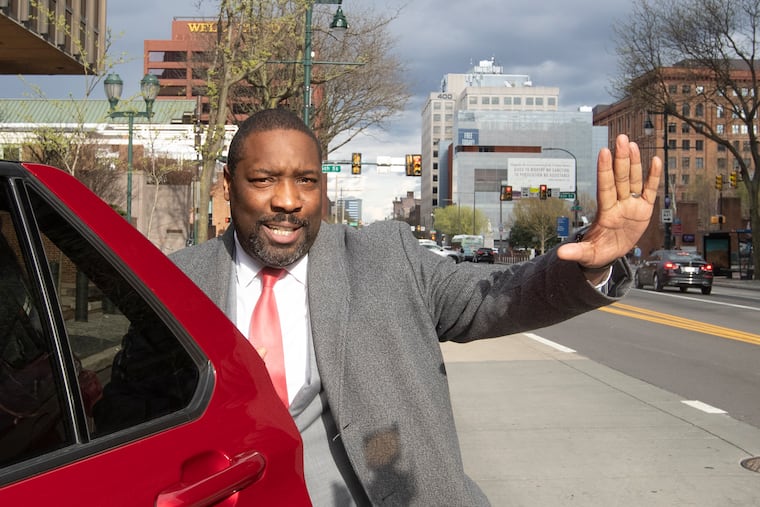‘We’re happy for him’: Kenyatta Johnson’s supporters say they’re pleased with bribery mistrial
The city councilmember's supporters expressed a sigh of relief for Johnson and his wife, Dawn Chavous after their bribery trial ended with a hung jury. Prosecutors vowed to retry the case.

Reginald Corleone clapped as he emerged from Philadelphia’s federal courthouse Tuesday afternoon.
The 52-year-old was bursting with audible relief just minutes after a federal judge declared a mistrial in the bribery case against his childhood friend, City Councilmember Kenyatta Johnson.
While federal prosecutors have already vowed to retry the case, the jury’s deadlock came as good as a “not guilty” verdict in the minds of friends and family who accompanied Johnson and his wife, Dawn Chavous, out of the courtroom.
“He was innocent,” Corleone said. “We’re happy for him. He can get back to his family and start moving forward again.”
» READ MORE: Feds vow to retry Kenyatta Johnson and his wife, Dawn Chavous, on bribery charges after hung jury results in mistrial
Corleone was one of dozens of supporters who packed the courtroom for the duration of the 20-day trial, listening as prosecutors poured through a deluge of financial records and emails in an attempt to convince the jury that Johnson had taken a bribe from former executives at Universal Companies in the form of a “low show” political consulting contract for his wife.
The jury’s deliberation ended in an anticlimactic fashion — no verdict, no prayer groups, no singing of hymns. After the mistrial, Johnson offered few words before entering a car with his wife, promising to continue fighting for the residents he represents. The two lead prosecutors in the case, meanwhile, disappeared down Market Street without a word.
A central part of the prosecutors’ case was establishing that the couple were financially prone to bribery — and to that end, they put the microscope on the family pocketbook. Prosecutors said Johnson and his wife were anticipating the birth of their first child and dealing with climbing credit card debt and other expenses related to their two homes when Chavous took the contract with Universal.
Meanwhile, Universal needed Johnson’s help in getting the Royal Theater rezoned for redevelopment and support to keep lots at 13th and Bainbridge Streets amid their own financial troubles.
But with no smoking gun, both the prosecution and the defense focused on the $66,750 salary that Universal paid Chavous over 16 months. Given the hours she billed, the prosecution contended that sum amounted to an hourly rate of more than $1,660 an hour — the cost of allegedly helping the financially turbulent nonprofit. The defense, however, argued the nonprofit was paying for Chavous’ fund-raising expertise and contacts in the charter school world.
“The issue in this case was that there was no evidence,” Patrick Egan, Johnson’s defense attorney, said outside the courthouse Tuesday. “Fortunately some of the jurors obviously saw it that way also, as well.”
For the Rev. Jeanette Davis, a pastor in Northeast Philadelphia and a gun violence prevention advocate who has worked closely with Johnson, the victory was aided by the religious support that galvanized around Johnson and Chavous.
“It’s biblical,” Davis said. She quoted a passage from the Bible: “The effectual fervent prayer of a righteous man or woman availeth much.”
In other words: Prayer works, and this was a divine intervention. Johnson and Chavous attended a prayer vigil with supporters in South Philadelphia in the days leading up to the trial, and throughout weeks of testimony, local clergy members packed the courtroom alongside friends, political insiders, and the occasional former elected official.
Still, Davis acknowledged, after 25 hours of jury deliberation beginning last week, no one was sure which way the cards would fall until the mistrial was declared.
“Things could have gone a different way,” Davis said.
Already prosecutors have vowed to retry Johnson and his wife, much to the chagrin of supporters like Claudia Smith Sherrod, who has known Johnson and Chavous for decades and attended a couple of days of the trial.
“It’s horrible what they had to go through, unfair that our tax dollars are being wasted,” she said, calling the charges and any attempts to put the couple through another trial “bogus.”
Some supporters also expressed shock at how deeply the trial exposed the couple’s personal lives, laying bare their finances through a raft of credit card statements, bank records, and overdraft fees.
“What I realized when I was sitting there is how invasive that type of process is,” said Albert Littlepage, a community activist and ally of Johnson’s in South Philadelphia, who attended the trial for several days. “I was thinking, ‘Wow, they’re just stripping these people naked.’”
Littlepage added that the trial made him “lose a little bit of faith in the government,” after viewing what he saw as a big swing and a miss.
In recent years, federal prosecutors have boasted a winning record in high-profile cases against elected officials in the region. Johnson’s mistrial marks the first unfavorable outcome for them since the acquittal of former State Sen. Larry Farnese in 2017, even as the feds have secured major convictions against former City Councilmember Bobby Henon, District Attorney Seth Williams, and U.S. Rep. Chaka Fattah.
But now, he said, Johnson’s circle of supporters feel they can move forward.
“The community is happy,” said Littlepage. “And we’re hopeful that the government will see their error.”